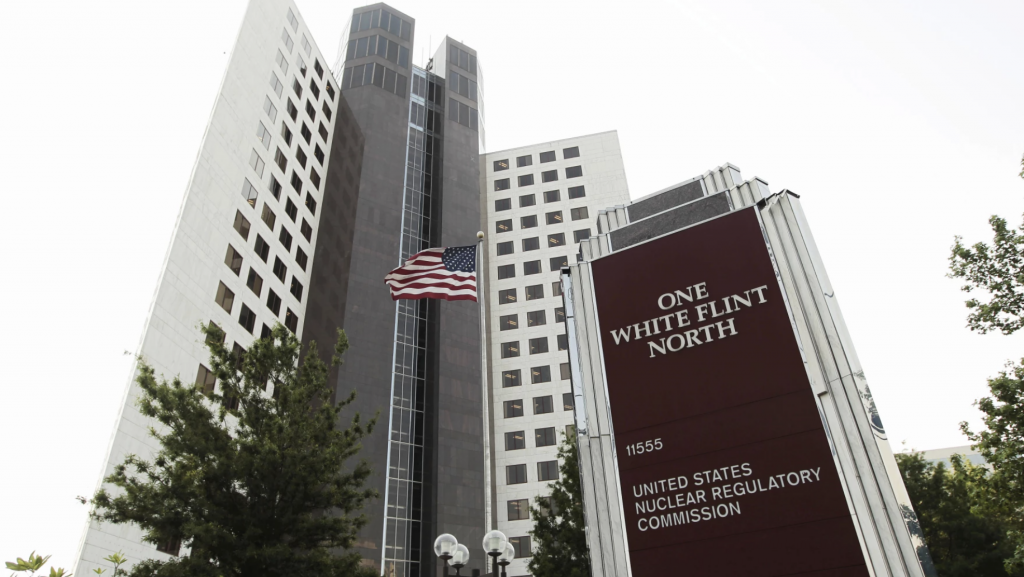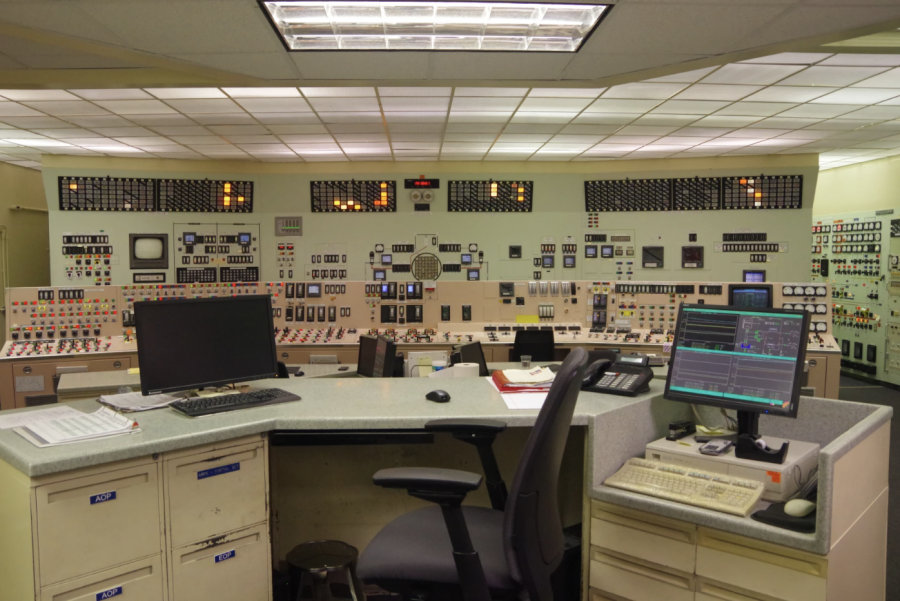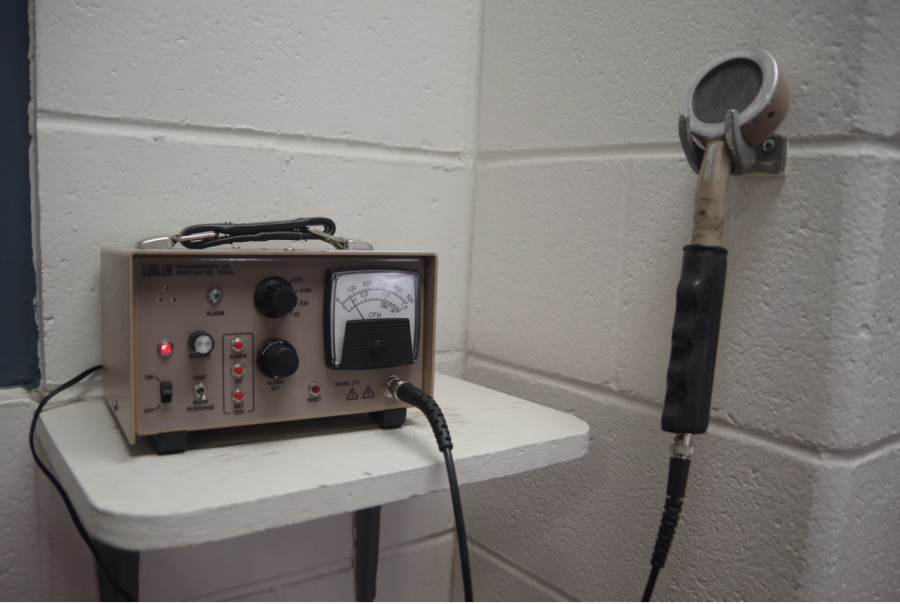A new law aims to advance US nuclear power, but some fear it shortchanges safety
Michael Symonds July 24, 2024On July 9, President Joe Biden signed a bill that among other things will change the mission statement of the Nuclear Regulatory Commission.

The Nuclear Regulatory Commission headquarters in Rockville, Md., in May 2011.
It’s been over two years since the Palisades Nuclear Plant on the shores of Lake Michigan closed its doors. But decommissioning company and Palisades owner Holtec International hopes to restart it.
“We are ready to make history and we’re going to make history,” said operations manager Paul Rhodes, who’s been with Palisades for 25 years.
During a tour of the facility last spring, large equipment lay dormant in expansive open rooms as Holtec’s team worked to get the plant in operational order.

“It’s never been done before. So not only do we have people who left that want to come back because of that, they also want to come back because of the culture that we had here,” Rhodes said.
A new mission for new times
The plan to reopen Palisades has bipartisan support, and it’s unfolding amid a push to expand nuclear energy across the country.
Advocates say nuclear could boost the economy while cutting emissions. But the U.S. nuclear industry has catching up to do.
That’s where the ADVANCE Act comes in. U.S. Senator Shelley Moore Capito of West Virginia is behind the legislation. She spoke during a Senate vote on amendments in June.
“Not only is it necessary to continue developing and deploying more nuclear energy reactors from an energy and environmental standpoint, it is also vital to our national security, and it’s good for the economy.”
The ADVANCE Act pertains to the Nuclear Regulatory Commission, the body that regulates all nuclear plants in the U.S., which will decide whether Palisades can reopen.
Among other things, the Act directs the NRC to add a new element to its mission statement, stating that it will not “unnecessarily limit” the civilian use of radioactive materials, deployment of nuclear energy, or the benefits these two things bring to society.
The NRC declined to comment on the new law before deadline.
Nuclear reactions
Brendan Kochunas is an assistant professor in the University of Michigan’s Department of Nuclear Engineering and Radiological Sciences.
He’s OK with the ADVANCE Act. He said the new law does not change the NRC’s other commitments like protecting public health and safety.

Kochunas added that the law will help put the U.S. in line with countries that have made leaps in nuclear technology.
“One could argue that China is doing this more quickly because the regulatory agency or body is more efficient.”
Kochunas also points to provisions allowing for an increase in the NRC’s workforce. He said that will allow the NRC to become more efficient while still maintaining safety.
“I think the NRC has been one of those agencies that has seen a lot of attrition and experience loss over the last few decades to retirements, and they are having trouble replacing that workforce.”
Physicist Edwin Lyman said he supports the increased staffing of the NRC, but he said doing so to address the concerns of the private nuclear industry is a step in the wrong direction.
“Introducing this commercial and promotional consideration, that’s really harmful and really would undermine the last 50 years of nuclear safety.”

Lyman is the director of nuclear power safety for the advocacy group the Union of Concerned Scientists.
He said the nuclear industry views the regulator as a bureaucratic dinosaur that hinders more than it helps.
Lyman said the new mission statement could be used against the agency.
“My fear is that the regulated community, that is the nuclear industry, will come in and attack essentially every move the NRC tries to make to strengthen safety by asserting that that’s going to limit what they can do.”
But enthusiasm for the ADVANCE Act ran high on both sides of the aisle. Only 13 House members voted against it, along with two members of the Senate.
Democratic U.S. Rep. Rashida Tlaib of the Detroit-area 12th district was the only Michigan member of Congress who did not vote for the ADVANCE Act.
Tlaib explained her decision to vote ‘present’ in an email statement to WMUK.
“I voted present in objection to the ridiculous decision to tie the reauthorization of vital firefighting programs for our communities together with poison pills that undermine nuclear safety and were strongly opposed by leading grassroots environmental organizations like Friends of the Earth and Food and Water Watch,” Tlaib wrote.
“I have very strong relationships with the fire chiefs in my district, and explained the situation to them ahead of the vote. They were as surprised as anyone that their critical funding was being tied to completely unrelated legislation to fast-track dangerous nuclear energy.”
Michael Symonds reports for WMUK through the Report for America national service program.
Trusted, accurate, up-to-date.
WDET strives to make our journalism accessible to everyone. As a public media institution, we maintain our journalistic integrity through independent support from readers like you. If you value WDET as your source of news, music and conversation, please make a gift today.
Over the past decade, the effects of climate change have led to a major increase in flooding events in cities like Detroit. That’s partly due to climate change, and because the city’s infrastructure is aging.
But, there’s another hidden contributor that’s leading to severe flooding in cities. They are called “ghost streams,” or waterways that previously existed but were either buried underground or filled in to support urban development.
On a recent episode of Created Equal, Stephen Henderson spoke with Jacob Napieralski, a geology professor at the University of Michigan – Dearborn about how “ghost streams” contribute to flooding in Detroit.
But, what are we doing to alleviate severe flooding in the city? And how should residents be prepared to defend against flooded homes and businesses?
To discuss this, Gary Brown, the director of the Detroit Water and Sewerage Department (DWSD), joined The Metro Monday. He talked with host Tia Graham and guest host Vickie Thomas, communications director for the city of Detroit.
Subscribe to The Metro on Apple Podcasts, Spotify, NPR.org or wherever you get your podcasts.
After the storms in 2021 that “devastated 20% of Detroit,” the Great Lakes Water Authority and DWSD took charge to make changes and help prevent flooding. Brown said the Great Lakes Water Authority added new substations, transformers and electrical lines, and got necessary maintenance done on the pumps so the system can mitigate flooding.
“Well, what we can do to mitigate flooding is number one, let’s make sure we have as much capacity in our stores as possible,” Brown said. “So let’s clean them. Let’s get all the tree roots and debris out so that when we have heavy rain, we have at least as much capacity in those lines as possible.”
The DWSD has also helped homeowners in Detroit from flooding by participating in the Basement Backup Protection Program. This program involves DWSD workers to put in a backflow preventer in eligible houses to help prevent basement flooding.
“So that when there’s heavy rain, there will be a flap that will drop down inside of a homeowner’s lateral sewer line and prevent flooding from backing up into those homes,” Brown said. “And so we’ve done more than 400, I believe, homes so far, and we’ve got dollars to do another 3,000.”
DWSD recently received another $14 million to continue the program.
According to Brown, DWSD crews will restart implementing the program in early August. Crews will continue to install backflow preventers and sump pumps to redirect water flow away from the houses.
With heavy rain and storms expected to hit metro Detroit Monday night going into Tuesday, Brown said “I’m always worried” about flooding. However, the water systems are designed to handle 1.67 inches per hour.
Still, Brown says, “make sure that your gutters are clean so that water doesn’t spill over outside the gutter and go down toward the foundation of the house. Please, if you have valuables in your basement, make sure that you remove anything of value that could be damaged.”
Houses with the Basement Backup Preventer installed should not flush the toilet, take a shower, or run the dishwasher during a rain event.
“And just like the water can’t back up into the house while the rain event is going on. It can’t get out of the house either,” Brown said. “And so you want to be cognizant of that. But that’s a pretty good trade off.”
Use the media player above to hear the full interview with Brown.
More headlines from The Metro on July 15, 2024:
- The state plans to build 100,000 public chargers by 2030. Right now, it’s way behind on that goal, as Michigan only has 3,400 public ports. That trend is about to change as Consumers Energy announced last week that it will be facilitating the installation of 1,500 fast-chargers by 2030. Electric vehicle programs director for Consumers Energy, Jeff Myrom, joined The Metro to talk about how they will be doing that and what it means.
- WDET reporters Russ McNamara and Quinn Klinefelter are in Milwaukee this week covering the Republican National Convention. WDET News Director Jerome Vaughn joined The Metro to discuss how Trump’s assassination attempt on Saturday will impact the convention.
Listen to The Metro weekdays from 11 a.m. to noon ET on 101.9 FM and streaming on-demand.
Trusted, accurate, up-to-date.
WDET strives to make our journalism accessible to everyone. As a public media institution, we maintain our journalistic integrity through independent support from readers like you. If you value WDET as your source of news, music and conversation, please make a gift today. Donate today »Author
-
 Report for America national service program corps member Michael Symonds joined WMUK’s staff in 2023. He covers the “rural meets metro” beat, reporting stories that link seemingly disparate parts of Southwest Michigan.
Report for America national service program corps member Michael Symonds joined WMUK’s staff in 2023. He covers the “rural meets metro” beat, reporting stories that link seemingly disparate parts of Southwest Michigan.
